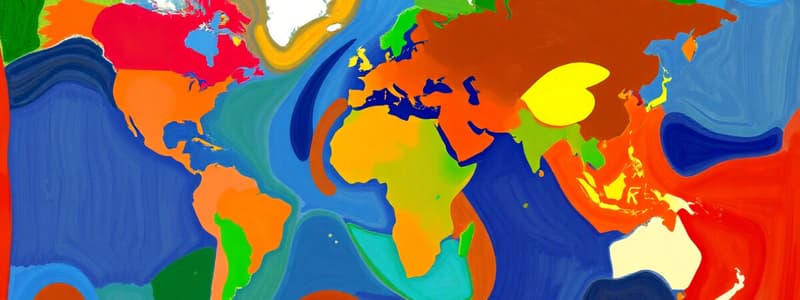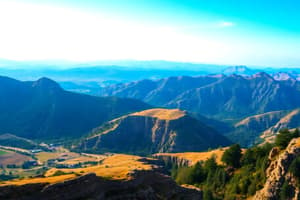Podcast
Questions and Answers
Which branch of geography focuses on natural features like landforms and climate?
Which branch of geography focuses on natural features like landforms and climate?
- Urban Geography
- Cultural Geography
- Human Geography
- Physical Geography (correct)
What does the term 'absolute location' refer to in geography?
What does the term 'absolute location' refer to in geography?
- The exact coordinates of a place (correct)
- Describing a place in relation to other places
- The physical characteristics of a location
- The cultural attributes of a region
Which of the following is a tool used in geography for spatial data analysis?
Which of the following is a tool used in geography for spatial data analysis?
- Sociological Theories
- Census Data
- Genetic Mapping
- Remote Sensing (correct)
What does the concept of 'cultural landscape' signify in geography?
What does the concept of 'cultural landscape' signify in geography?
In geography, a 'region' is defined by which of the following?
In geography, a 'region' is defined by which of the following?
What does globalization refer to in the context of geography?
What does globalization refer to in the context of geography?
What does the term 'human-environment interaction' explore?
What does the term 'human-environment interaction' explore?
Which of the following is a common issue currently examined in geography?
Which of the following is a common issue currently examined in geography?
Flashcards are hidden until you start studying
Study Notes
Definition of Geography
- Study of the Earth's landscapes, environments, and the relationships between people and their environments.
Branches of Geography
-
Physical Geography
- Focuses on natural features (landforms, climate, vegetation).
- Includes subfields like geomorphology, climatology, and biogeography.
-
Human Geography
- Examines human activities and their spatial implications.
- Covers urban geography, economic geography, cultural geography, and political geography.
-
Geographical Techniques
- Use of tools like GIS (Geographic Information Systems), remote sensing, and cartography.
- Involves data collection, analysis, and interpretation.
Key Concepts in Geography
-
Location
- Absolute Location: Exact coordinates (latitude and longitude).
- Relative Location: Position in relation to other locations.
-
Place
- Characteristics that make a location unique (physical and human traits).
-
Region
- Areas defined by common features (cultural, physical, political).
- Types: Formal (uniform), functional (nodal), vernacular (perceptual).
-
Movement
- Patterns and processes of transportation and communication.
-
Human-Environment Interaction
- Ways humans adapt to and modify their environment.
Tools of Geography
-
Maps
- Representations of geographic space.
- Types of maps: topographic, thematic, political.
-
GIS
- Technology for mapping and analyzing spatial data.
- Integrates various data layers for comprehensive analysis.
-
Remote Sensing
- Gathering data from satellites or aerial photography for earth observation.
Important Geographic Concepts
-
Scale
- The relationship between map distance and real-world distance.
-
Cultural Landscape
- The visible imprint of human activity on the landscape.
-
Globalization
- Increasing interconnectedness of countries and cultures.
Environmental Geography
- Examines the relationship between humans and the environment.
- Topics include sustainability, conservation, and climate change.
Current Issues in Geography
- Urbanization and its impact on environments.
- Climate change and its geographical implications.
- Resource distribution and geopolitical conflicts.
Definition of Geography
- Geography studies Earth's landscapes, environments, and the interplay between humans and their surroundings.
Branches of Geography
-
Physical Geography
- Investigates natural features such as landforms, climate, and vegetation.
- Encompasses subfields like geomorphology (landform study), climatology (climate patterns), and biogeography (distribution of ecosystems).
-
Human Geography
- Analyzes human activities and their spatial implications on society and environment.
- Includes urban geography (study of cities), economic geography (resource distribution), cultural geography (cultural practices), and political geography (politics-related spatial analysis).
-
Geographical Techniques
- Utilizes tools like Geographic Information Systems (GIS), remote sensing, and cartography for spatial data handling.
- Involves systematic data collection, analysis, and interpretation of geographic information.
Key Concepts in Geography
-
Location
- Absolute location defines exact coordinates using latitude and longitude.
- Relative location refers to a place's position concerning other locations.
-
Place
- Characteristics that distinguish a location, encompassing both physical features and human attributes.
-
Region
- Areas defined by shared traits, which can be cultural, physical, or political.
- Types of regions include formal (uniform characteristics), functional (areas centered around a node), and vernacular (perceptual understanding of a region).
-
Movement
- Involves patterns and processes associated with transportation and communication across spaces.
-
Human-Environment Interaction
- Explores how humans adapt to and alter their environmental contexts.
Tools of Geography
-
Maps
- Serve as vital representations of geographic space, available in various forms such as topographic (elevation), thematic (specific themes), and political (territorial boundaries).
-
GIS
- A technological approach for mapping and analyzing spatial data, allowing for the integration of multiple data layers for thorough analysis.
-
Remote Sensing
- Involves collecting data from satellites or aerial imagery for effective earth observation.
Important Geographic Concepts
-
Scale
- Refers to the relationship between the distance on a map and the corresponding distance in the real world, crucial for understanding spatial relationships.
-
Cultural Landscape
- Represents the visible imprint of human activity on the natural landscape, showcasing how culture influences environment.
-
Globalization
- Highlights the growing interconnectedness among countries and their cultures, impacting social and economic landscapes globally.
Environmental Geography
- Focuses on exploring the interrelation between human activities and the natural environment, discussing sustainability, conservation efforts, and climate change challenges.
Current Issues in Geography
- Analyzes urbanization, emphasizing its environmental impacts and spatial challenges.
- Investigates climate change with an emphasis on geographical consequences and regional responses.
- Examines resource distribution issues, often leading to geopolitical conflicts and competition among nations.
Studying That Suits You
Use AI to generate personalized quizzes and flashcards to suit your learning preferences.




